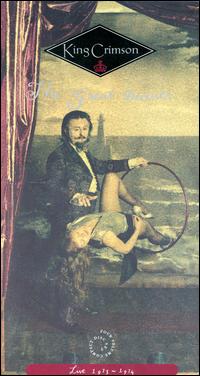The first disc presents the penultimate gig by the band, completed at the start of disc two. (Even the “Walk On” and “Walk Off” music from (No Pussyfooting) is included for posterity.) This show was the source of “Providence” on Red, presented unedited here, and “21st Century Schizoid Man” on USA, where it was overdubbed. In those days Fripp would actually engage the crowd with announcements, and here his introduction of a well-received improvisation called “A Voyage To The Centre Of The Cosmos” is peppered with his own chuckles.
The bulk of the second disc comes from nine months earlier in Glasgow, and includes the full improv that would be edited and titled “We’ll Let You Know” on Starless And Bible Black. Here the opening jam before “Larks’ Tongues Part One” is called “Sharks’ Lungs In Lemsip”; another improv gets the title “Tight Scrummy” and is built around an almost comically prominent rhythm machine. A surprising encore arrives with Fripp strumming “Peace: A Theme” before the band goes into “Cat Food”. Ten minutes of material from a later show at Penn State fill up the disc, and stay tuned for a hidden track wherein Fripp signals engineer George Chkiantz to change tapes.
Disc three is devoted to a show from Pittsburgh with a rowdy audience. Here the “Walk On” music is smacked away by a furious “Great Deceiver”, but having to tune the Mellotrons quiets the proceedings down quickly into one improv. “Exiles” builds the tension, but Fripp follows that with a pretty piece for guitar and violin dubbed “Daniel Dust”. Things pick up for “Doctor Diamond”, a mushmouthed original that never really gelled. An improv called “Wilton Carpet” moves into “The Talking Drum” and then an “abbreviated” “Larks’ Tongues Part Two”. (Another fourteen minutes from Penn State end the disc, consisting of another announcement from Fripp asking “Is there life out there?”, whence the following improv gets its title; another hidden track demonstrates further onstage tuning of two Mellotrons.)
Disc four opens in Toronto with a furious (there’s that word again) piece called “The Golden Walnut”, which sports a riff one day better knows as “One More Red Nightmare”, and eventually dwindles to silence. After “The Night Watch” and “Fracture” comes another improv, cheekily dubbed “Clueless And Slightly Slack”, and a phrase used throughout the booklet. From there we go a Zurich show for plenty of improvisation, one of which is called “The Law Of Maximum Distress” and split into two parts due to a missing tape. As it turns out, that missing piece had been chopped out of the master back in 1973 to be overdubbed as “The Mincer” on Starless And Bible Black. Further dying Mellotron fuels the prelude to “The Talking Drum”, which ends abruptly, along with the entire set.
Once again design was treated with the same respect as the music, from individually unique disc titles and artwork to the comprehensive booklet that incorporated vintage Fripp diary entries from the period, which chronicle the eventual demise of the quartet whilst on the road. He also took the opportunity to expound on further corruption in the music industry, as was his wont, since his previous notes. There is some commentary from the other principals, but most space is given over to a continuation of the press clippings excerpted in the previous box—namely reviews, both positive and negative, of Frame By Frame. (In this century the set was reissued as separate two-disc sets with simpler packaging than the original box.)
Five years later, another important archival piece arrived in the form of The Nightwatch. This two-disc set presents the bulk of the Amsterdam concert that provided the bulk of Starless And Bible Black. Expanding on the background provided in the Great Deceiver booklet, the copious liner notes explain the conditions under which this particular show came to be, and how miserable the band members were at this point of the tour. The result is a portrait of a band pulling excellence out of despair. The audience enjoyed themselves.Much of the material from this era would one day be parceled out as direct downloads, and in the Starless and Road To Red mega-box sets. These discs provide gradual steps into that well.
King Crimson The Great Deceiver: Live 1973-1974 (1992)—3
King Crimson The Nightwatch (1997)—3½


No comments:
Post a Comment